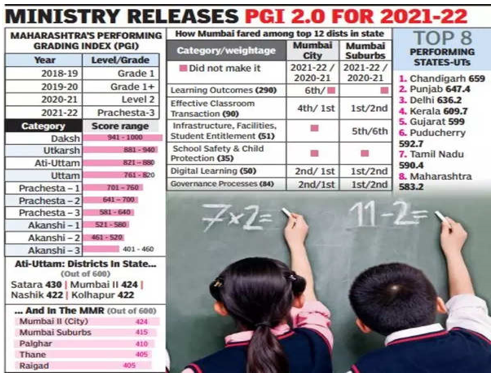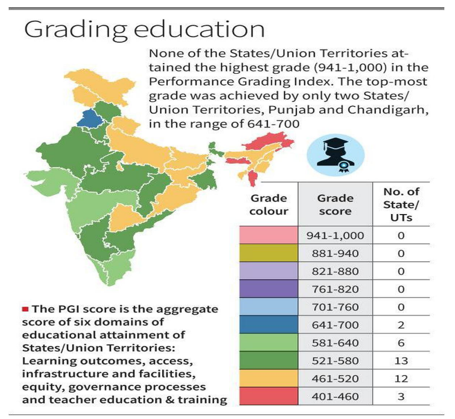- Courses
- GS Full Course 1 Year
- GS Full Course 2 Year
- GS Full Course 3 Year
- GS Full Course Till Selection
- Answer Alpha: Mains 2025 Mentorship
- MEP (Mains Enrichment Programme) Data, Facts
- Essay Target – 150+ Marks
- Online Program
- GS Recorded Course
- Polity
- Geography
- Economy
- Ancient, Medieval and Art & Culture AMAC
- Modern India, Post Independence & World History
- Environment
- Governance
- Science & Technology
- International Relations and Internal Security
- Disaster Management
- Ethics
- NCERT Current Affairs
- Indian Society and Social Issue
- NCERT- Science and Technology
- NCERT - Geography
- NCERT - Ancient History
- NCERT- World History
- NCERT Modern History
- CSAT
- 5 LAYERED ARJUNA Mentorship
- Public Administration Optional
- ABOUT US
- OUR TOPPERS
- TEST SERIES
- FREE STUDY MATERIAL
- VIDEOS
- CONTACT US
PERFORMANCE GRADING INDEX FOR DISTRICTS
PERFORMANCE GRADING INDEX FOR DISTRICTS
10-07-2023

Latest Context
Recently, the Ministry of Education (MoE) released the Performance Grading Index for Districts (PGI-D) for the year 2020-21 to 2021-22 for assessing the performance of the school education system at the district level.
Performance Grading Index for Districts (PGI-D)
- Concept: PIG-D is the medium through which the performance of the school education system at the district level is assessed by creating an index for comprehensive analysis.
- On the basis of the data collected from various sources, including the Unified District Information System for Education Plus (UDISE +), National Achievement Survey (NAS), 2017 and data provided by respective districts, the performance in school education at the district level is determined.
- MoE has issued five annual reports which offer insights on the status of school education in States and UTs since 2017-18.
Grades: Under this report, there are 10 grades under which districts are categorized
- Daksh: Highest grade (above 90%)
- Utkarsh: 81%-90%
- Ati-Uttam: 71%-80%
- Uttam: 61%-70%
- Prachesta-1: 51%-60%
- Prachesta-2: 41%-50%
- Prachesta-3: 31%-40%
- Akanshi-1: 21% to 30%
- Akanshi-2: 11% to 20%
- Akanshi-3: Lowest (less than 10%)
Indicators: The structure of PGI-D contains a total weightage of 600 points across 83 indicators that are divided into six categories viz., Outcomes, Effective Classroom Transaction, Infrastructure Facilities Student’s Entitlements, School Safety & Child Protection, Digital Learning and Governance Process.
Significance
- It will support the state education departments in identifying gaps at the district level and improving performance in a decentralized manner.
- Districts can work towards reaching the highest grade and enhancing overall education quality by prioritizing areas for intervention.
Main Points of the Report
-
Pandemic Effect on District Performance:
- Not even a single district was able to come on the top two grades (Daksh and Utkarsh).
- Total number of Ati-Uttam districts are declined significantly from 121 in 2020-21 to 51 in 2021-22 which exhibits the effect of the pandemic on educational performance.
- Many districts of different states were categorized as Ati-Uttam in both 2020-21 and 2021-22, comprising Krishna and Guntur in Andhra Pradesh, Chandigarh, Dadra Nagar Haveli, districts in Delhi, Karnataka, Kerala, Odisha etc.
-
Changes in Grades
- In 2021-22, the total number of Prachesta-2 (sixth-highest grade) districts increased from 86 in 2020-21 to 117.
- Due to the disruptions caused by the pandemic, it suggests that more districts faced challenges in maintaining their performance.

PGI 2.0
- Concept: It is a comprehensive assessment tool devised by the MoE in order to evaluate the performance of the school education system at the State/UT level. It determines the performance of a school on the basis of various indicators and creates an index for comprehensive analysis. It was first issued for the year 2017-18 and has been updated up to the year 2020-21.
- Revised Structure: In the year 2021-22, the PGI was revised and renamed as PGI 2.0. Now it comprises 73 indicators grouped into two categories:
- Outcomes and Governance Management (GM). It lays emphasis on qualitative assessment, digital initiatives, and teacher education.
- Categories and Domains: It is grouped into six domains namely Learning Outcomes (LO), Access (A), Infrastructure and Facilities (IF), Equity (E), Governance Process (GP), and Teachers’ Education and Training (TE&T). Various aspects of the education system come under these domains.
- Grading System: On the basis of the points scored across the indicators, States and Union Territories are assigned grades.
- Daksh (941-1000) is the highest and Akanshi-3 (401-460) is the lowest.
-
Findings
- In the latest edition, no States/UTs achieved the top grades.
- There are only two states/UTs, namely Punjab and Chandigarh have attained Grade Prachesta -2 (score 641-700).
- Andhra Pradesh has secured Grade 8 (Category: Akankshi-1) in PGI 2.0.
- Starting from no grade in 2017-18 to attaining Level II with a score of 901, Andhra Pradesh has made significant progress in its grades over the years.
Other Initiatives of the Government
- National Education Policy, 2020
- Samagra Shiksha
- Mid-Day Meal Scheme
- Rajiv Gandhi National Fellowship Scheme and Eklavya Model School
- National Program on Technology Enhanced Learning.
- Sarva Shiksha Abhiyan
- PRAGYATA
- Mid-Day Meal Scheme
- Beti Bachao Beti Padhao
- PM SHRI Schools
Must Check: IAS Coaching Centre In Delhi



